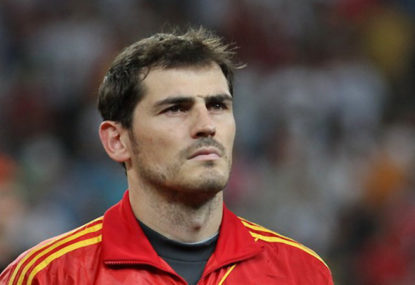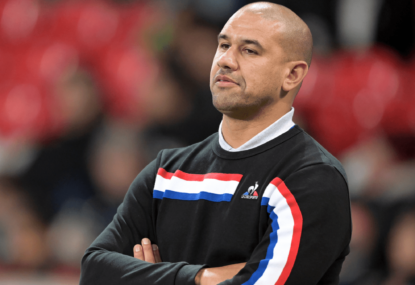For the first time in eight years and 36 qualifying matches, Spain have lost. It wasn’t to a big nation either, it was to wee Slovakia, currently ranked 40th.
However, to say that a loss was unexpected is an interesting statement.
Having blitzed all and sundry in the international game for 12 years, a duck-breaking World Cup win sandwiched between their second and third Euro triumphs, a golden generation of Spanish players have come to the end of their careers.
Players like Iker Casillas (33 years old), Gerard Pique (27), Cesc Fabregas (27) and David Silva (28) probably only have one or two major tournaments left in them. Xabi Alonso (32), Xavi (34) and Melbourne City’s very own David Villa (32), Spain’s highest scorer with 59 goals, have all retired from national duties.
These last three players were arguably the heartbeat of the side at its peak.
However, throughout the age spectrum, Spain is still stocked with talent. Jordi Alba, Javi Martinez and Diego Costa are all in their mid-20s, and players like Dani Carvajal, Koke, and Gerard Deulofeu are another few years younger than that.
Although football is a team game, and I do wish to stress that international football is so haphazard. There is such a small time frame for coaches to really bed in their ideas and individual quality is usually far more the decisive difference.
It seems that Spain have succumbed to the usual hangover that comes after a golden generation hosts the best party a nation could have. It happened before with the Australian cricket team after the excess success of the 1990s and 2000s.
The brilliance of the players meant there was little opportunity, probably coupled with little enthusiasm from the administrators, to blood the next-born generation of Australian players. The subsequent retirement of the multi-capped contingent left the experience cupboard bare and impacted greatly on Ricky Ponting’s tenure.
Furthermore, other nations, most notably England, had learnt from Australia’s success and overhauled their training, coaching and recruitment methods. Cricket Australia, on the other hand, took the success for granted, which left a dearth of world-class talent and an overconfident, unsatisfactory approach to playing and administrating the game.
Vicente del Bosque, the 63-year-old who saw Spain through its World Cup and 2012 Euro win, stayed on as coach despite the Brazil debacle. The Spanish FA didn’t sack him either. For me, this was the first misstep. Spain, for whatever reason, perhaps overconfidence or complacency, were thoroughly despatched by both the Netherlands and Chile in the World Cup.
At the local football club I at played while growing up, there was a stalwart, Richard, an elderly West Ham supporter who had emigrated here from London. He was one of those fellas who had been helping out, coaching all sorts of age divisions and sides, dispensing advice here and there.
Richard had a piece of advice that has always stuck with me. He mightn’t have ever coached Spain to a World Cup, but his years of experience surely would account for something.
“I’ve never coached a side for more than three years,” Richard said.
“They stop listening to what you have to say after that.”
The Spanish players and administration might still believe in Del Bosque, and his methods may still be sound (unlike, say, Fabio Capello), but the results and experience of human society – and Richard – suggest that after too long, things go stale.
Del Bosque, too, is very loyal to the players that have got him through the past eight years. Casillas, despite his horrible form not only at the last World Cup but also during the past two years at Real Madrid, is still first-choice and captain of the Spaniards. Never mind bad form, Casillas has only made 27 appearances in the past two seasons.
In light of David de Gea’s superhuman performance against Everton on the weekend, it’s absolutely perplexing that Del Bosque has firmly stuck behind Casillas. At 33, it may be time for him to step down.
Since Villa’s retirement and Torres’ spectacular denouement, the only native strikers of any quality and age to pick from were Alvaro Negredo and Fernando Llorente, both of whom Del Bosque left out of this round’s international fixtures (although to be fair, Negredo is injured). I don’t watch 90 per cent of Spain’s games, so perhaps these players haven’t ever played well for Spain, despite their sharing of 44 caps and 17 goals between them, which isn’t a terrible return.
It is to Del Bosque’s detriment that the Red Fury currently isn’t as dangerous as it should be. Pre-World Cup, Diego Costa was seen as the saviour of Spain’s pointy-end of their spear, despite the aforementioned excellent strikers at their disposal. Del Bosque, though, should have thought of a plan B to facilitate these strikers and also win games against ultra-defensive sides.
He also should have anticipated the inevitable athletic decline of his star players that formed the foundation of Spain’s success, considering that goals win games and Negredo, Llorente and Costa rely on width, speed and space to score those goals.
As in life, things come and go in fashions. Some things might go, but were so dominant and revolutionary that their legacy remains for years – think punk music, jeans and tiki-taka.
However, this doesn’t mean the heroes of these dynasties should last forever. They always become superseded or altered, their brave stand against time futile in reflection. If Spain are to transition into their new, post tika-taka era, Del Bosque must go.



































































































